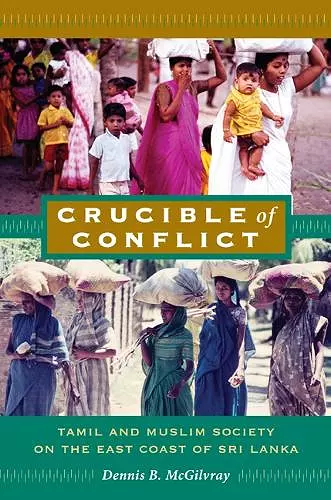Crucible of Conflict
Tamil and Muslim Society on the East Coast of Sri Lanka
Format:Paperback
Publisher:Duke University Press
Published:7th May '08
Currently unavailable, and unfortunately no date known when it will be back

Ethnography of a region in Sri Lanka known for its ethnic and religious diversity - a pivotal area in the ongoing guerrilla war
Presents an ethnographic and historical study of Hindu castes, matrilineal family structure, popular religious traditions, and ethnic conflict. This book presents an ethnography of Sri Lanka's east coast, an area that suffered heavily in the 2004 tsunami and a region of vital significance to the political future of the island nation.Crucible of Conflict is an ethnographic and historical study of Hindu castes, matrilineal family structure, popular religious traditions, and ethnic conflict. It is also the first full-length ethnography of Sri Lanka’s east coast, an area that suffered heavily in the 2004 tsunami and that is of vital significance to the political future of the island nation. Since the bitter guerrilla war for an independent Tamil homeland in Sri Lanka broke out in 1983, the easternmost region of the island has emerged as a strategic site of conflict. Dennis B. McGilvray argues that any long-term resolution of the ethnic conflict must accommodate this region, in which Sinhalese Buddhists, Tamil Hindus, and Tamil-speaking Muslims are each a significant share of the population.
McGilvray explores the densely populated farming and fishing settlements in this coastal zone, focusing on the Tamil and Muslim inhabitants of an agricultural town in the Ampara District. Drawing on fieldwork conducted over more than thirty years as well as on Tamil and Dutch historical sources, he describes the regional dominance of a non-Brahmin matrilineal caste of thirteenth-century Kerala origin. The Muslims, who acquired dowry lands and matrilineal family patterns through local intermarriages, have in the twentieth century emerged from Hindu caste domination and are now the Tamil Hindus’ political and economic equals. Crucible of Conflict offers a uniquely detailed account of Muslim kinship and community organization in eastern Sri Lanka, as well as a comparison of Tamil and Muslim practices and institutions. McGilvray concludes with an analysis of the interethnic tensions and communal violence that have intensified in recent years.
“For the forseeable future, anyone interested in the people of Sri Lanka’s eastern coast will need to consult Dennis B. McGilvray’s magisterial and definitive new book.” - Mark Whitaker, Journal of Anthropological Research
“McGilvray’s book will certainly provide a benchmark for all future work in this part of Sri Lanka, and it provides the essential context for the work of other important anthropologists writing about Eastern Sri Lanka. . . . It is also extremely well written and exemplifies the strengths of detailed long-term field research in providing intellectually persuasive anthropological analysis.”
- R.L. Stirrat, Journal of the Royal Anthropological Institute
“The strength of this book is its perspicuity of the history and minutiae of social relations of and between Tamils and Muslims in eastern Sri Lanka.” - Vivian Y. Choi, Current Anthropology
“Crucible of Conflict is clearly one of the most important books on Sri Lanka to be published in decades. Dennis B. McGilvray has written a rich, thorough, historically grounded ethnography of a fascinating but understudied region, and he has articulated it with the most contemporary regional, national, and world developments. He moves smoothly and never superficially from ancient history to his decades of ethnographic work, to world Islam, to the recent tsunami. This is work of lasting value, a book that will be cited and cited for years to come.”—Deborah Winslow, co-editor of Economy, Culture, and Civil War in Sri Lanka
“Dennis B. McGilvray has long been engaged in ethnographic and historical research among Muslims and Hindus in Sri Lanka’s matrilineal belt in the East Coast, the current scene of intense ethnic conflict and warfare. This much-awaited book will be indispensable for understanding the complexities of the nation’s ethnic conflict and a ‘must read’ for those working in South Asia, on ethnic conflict and resolution, on the vicissitudes of matrilineal descent and the complexities of historical and social change in this region.”—Gananath Obeyesekere, Professor of Anthropology Emeritus, Princeton University
“Recognized as a leading anthropologist of Sri Lanka, Dennis B. McGilvray has been studying the Tamil-speaking Hindus and Muslims of the country’s eastern region for some thirty years. McGilvray argues that it is in the eastern region that the future of the insurgency is being decided, and therefore the future of Sri Lanka itself. His book has great potential to deepen understanding of the crisis, and to show the strategic importance of this neglected region. It is a very rich work.”—Thomas R. Trautmann, author of Languages and Nations: The Dravidian Proof in Colonial Madras
“For the forseeable future, anyone interested in the people of Sri Lanka’s eastern coast will need to consult Dennis B. McGilvray’s magisterial and definitive new book.” -- Mark Whitaker * Journal of Anthropological Research *
“McGilvray’s book will certainly provide a benchmark for all future work in this part of Sri Lanka, and it provides the essential context for the work of other important anthropologists writing about Eastern Sri Lanka. . . . It is also extremely well written and exemplifies the strengths of detailed long-term field research in providing intellectually persuasive anthropological analysis.”
-- R.L. Stirrat * Journal of the Royal Anthropological Institute *
“The strength of this book is its perspicuity of the history and minutiae of social relations of and between Tamils and Muslims in eastern Sri Lanka.” -- Vivian Y. Choi * Current Anthropology *
ISBN: 9780822341611
Dimensions: unknown
Weight: 635g
448 pages